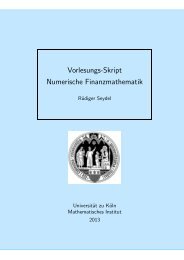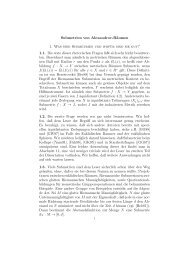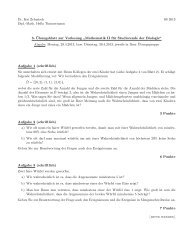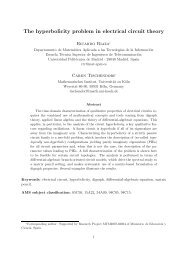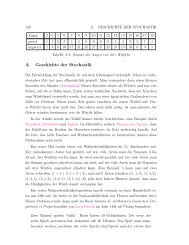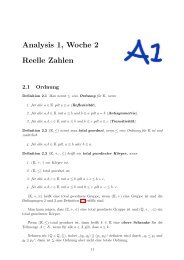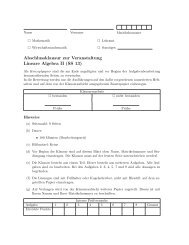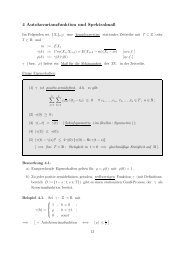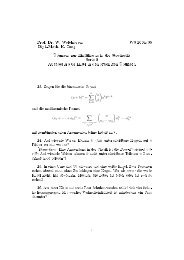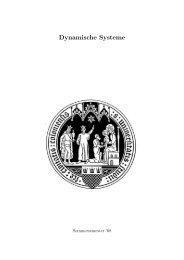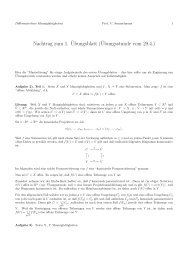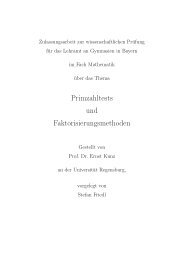Inhaltsverzeichnis - Mathematisches Institut der Universität zu Köln
Inhaltsverzeichnis - Mathematisches Institut der Universität zu Köln
Inhaltsverzeichnis - Mathematisches Institut der Universität zu Köln
Create successful ePaper yourself
Turn your PDF publications into a flip-book with our unique Google optimized e-Paper software.
DMV Tagung 2011 - <strong>Köln</strong>, 19. - 22. September<br />
Michael Matthes<br />
<strong>Universität</strong> <strong>zu</strong> <strong>Köln</strong><br />
Coupled systems as Abstract Differential-Algebraic Equations<br />
We study so called Abstract Differential-Algebraic Equations (ADAEs) which are Differential-Algebraic<br />
Equations (DAEs) with operators acting on infinite dimensional Hilbert or Banach spaces. In applications<br />
these equations arise when coupling DAEs and partial differential equations (PDEs). Information is<br />
shared between these two systems by certain coupling operators. For example specific models in circuit<br />
simulation were already studied in the literature in the context of ADAEs or PDAEs.<br />
While theory and numerics of DAEs and PDEs were well developed in the last 20 years there are just a<br />
few results for coupled DAE-PDE systems concerning solvability and convergence. We study a general<br />
prototype class of a coupled system where the infinite dimensional part of the system is governed by a<br />
monotone operator. Investigating especially the coupling terms we give an existence and uniqueness<br />
result of this prototype system. Also the Galerkin approach is discussed as it is important for numerical<br />
applications.<br />
Roland Pulch<br />
Bergische <strong>Universität</strong> Wuppertal<br />
Stochastic Galerkin Methods for Partial Differential Equations with Random Parameters<br />
We consi<strong>der</strong> partial differential equations (PDEs) of elliptic, parabolic and hyperbolic type. The PDEs include<br />
parameters, which may be uncertain due to measurements or a lack of knowledge. We replace the<br />
parameters by random variables to achieve an uncertainty quantification. The resulting stochastic model<br />
can be resolved by a Monte-Carlo simulation, for example. Alternatively, we apply a spectral method involving<br />
the expansion of the unknown random fields in the generalised polynomial chaos. This expansion<br />
is based on orthogonal polynomials defined in the un<strong>der</strong>lying random space. A stochastic Galerkin technique<br />
yields a larger coupled system of PDEs satisfied by an approximation of the required coefficient<br />
functions. We analyse the structure of the coupled systems in comparison to the original PDEs. The focus<br />
is on hyperbolic systems of PDEs, where the coupled system of the stochastic Galerkin method is<br />
not necessarily hyperbolic. Sufficient conditions are specified such that the coupled system inherits the<br />
hyperbolicity. We present numerical simulations of corresponding test examples.<br />
Literatur<br />
Pulch, R.; van Emmerich, C. (2009). Polynomial chaos for simulating random volatilities. Math. Comput.<br />
Simulat., 80, 245 - 255.<br />
Pulch, R.; Xiu, D. (2011). Generalised polynomial chaos for a class of linear conservation laws. to appear<br />
in: Journal of Scientific Computing, Springer.<br />
Xiu, D. (2010). Numerical methods for stochastic computations: a spectral method approach. Princeton<br />
University Press.<br />
82



